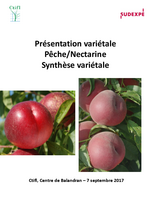Peach and nectarine cultivar presentation
New varieties of peaches and nectarines are being bred at a pace that exceeds the expectations of both growers and distributors. This constant renewal complicates the choice of growers faced with problems of orchard renovation. On the other hand, it allows them to improve quality in its different aspects, while ensuring meeting the sector’s needs regarding production and post-harvest characteristics.Every other year Ctifl, with the assistance of several regional experimental stations, organises at its Balandran research centre a commented presentation of peach and nectarine varieties in order to summarise the technical data available, especially for the new selections on offer. Those presentations are given in the framework of experiments carried out in accordance with the charter for the study of plant material, signed between Ctifl and the regional experimental stations Sud Expé, Centrex and Sefra, and coordinated by Ctifl regarding the study of behaviour.
The aim of the information supplied during the presentations is to assist growers in their choice of varieties, based on observations made in orchards set up to monitor tree behaviour. The information mainly concerns the following points:
- ripening date and position compared to the control varieties,
- characteristics of the tree: habit, period of bud break and bloom, floriferousness, thinning intensity, etc.,
- agronomic potential (yield, distribution of fruit size),
- aspect of the fruit, gustatory potential (Brix, acidity and aromatic potential),
- susceptibility to pests and diseases.
Documents

|
Peach and nectarine power point presentation - 7th sept. 2017 () Power point presentation |
Details
- Activity type
- Participation in scientific conference
- Activity work package
- Performance of new fruit varieties
- Activity number
- CTIFL-WP2-A9
- Activity contact
- Christian Hilaire (Ctifl) - [email protected]
- Activity partner
- CTIFL
- Activity country
- France
- Last edit
- 19-07-2019

The EUFRUIT thematic network has received funding from the
European Union's Horizon 2020 research and innovation programme
under grant agreement No 696337.
European Union's Horizon 2020 research and innovation programme
under grant agreement No 696337.